Related Research Articles

James the Just, or a variation of James, brother of the Lord, was "a brother of Jesus", according to the New Testament. He was an early leader of the Jerusalem Church of the Apostolic Age. Traditionally, it is believed he was martyred in AD 62 or 69 by being stoned to death by the Pharisees on order of High Priest Ananus ben Ananus.

The brothers of Jesus or the adelphoi are named in the New Testament as James, Joses, Simon, and Jude, and unnamed sisters are mentioned in Mark and Matthew. They may have been: (1) the sons of Mary, the mother of Jesus, and Joseph ; (2) sons of the Mary named in Mark 15:40 as "mother of James and Joses", whom Jerome identified with the wife of Clopas and sister of Mary the mother of Jesus; or (3) sons of Joseph by a former marriage. Those who uphold the perpetual virginity of Mary reject the idea of biological brethren and maintain that the brothers and sisters were either cousins of Jesus or children of Joseph from a previous marriage.

The Annunciation, also referred to as the Annunciation to the Blessed Virgin Mary, the Annunciation of Our Lady, or the Annunciation of the Lord, is the Christian celebration of the announcement by the angel Gabriel to Mary that she would conceive and bear a son through a virgin birth and become the mother of Jesus Christ, the Christian Messiah and Son of God, marking the Incarnation. Gabriel told Mary to name her son Jesus, meaning "YHWH is salvation".
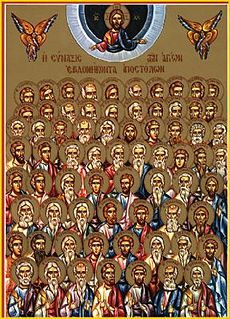
The seventy disciples or seventy-two disciples, known in the Eastern Christian traditions as the seventy apostles or seventy-twoapostles, were early emissaries of Jesus mentioned in the Gospel of Luke. The correct Greek terminology is evdomikonta (εβδομήκοντα) apostoli or evdomikonta mathetes.
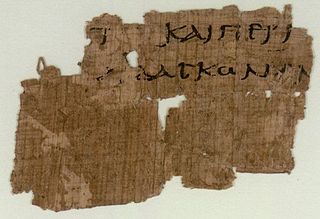
Matthew 4 is the fourth chapter of the Gospel of Matthew in the New Testament of Christian Bible. Many translations of the gospel and biblical commentaries separate the first section of chapter 4 from the remaining sections, which deal with Jesus' first public preaching and the gathering of his first disciples.

Matthew 28 is the twenty-eighth and final chapter of the Gospel of Matthew in the New Testament. This chapter records that Jesus is risen, describes the actions of the first witnesses to this event, and ends with the Great Commission.

Jesus' teachings referring to little children and infants/babies appear in several places in the New Testament and in the non-canonical Gospel of Thomas.
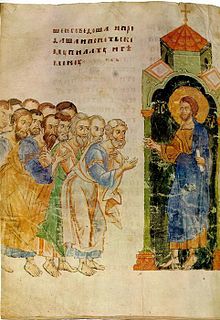
The saying of Jesus concerning his true relatives is found in the Canonical gospels of Mark and Matthew.
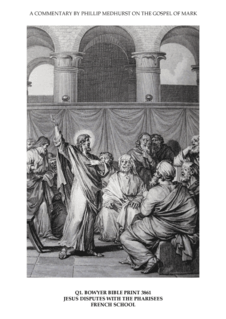
There are a number of episodes in the New Testament in which Jesus was rejected. Jesus is rejected in Judaism as a failed Jewish messiah claimant and a false prophet by most Jewish denominations.

Jude is one of the brothers of Jesus (Greek: ἀδελφοί, romanized: adelphoi, lit. 'brethren') according to the New Testament. He is traditionally identified as the author of the Epistle of Jude, a short epistle which is reckoned among the seven general epistles of the New Testament—placed after Paul's epistles and before the Book of Revelation—and considered canonical by Christians. Catholics and Eastern Orthodox Christians believe this Jude is the same person as Jude the Apostle and that Jude was perhaps a cousin, but not literally a brother of Jesus, or perhaps St. Joseph’s son from a previous marriage.
Matthew 12:47 is the 47th verse in the twelfth chapter of the Gospel of Matthew in the New Testament.
Matthew 12:48 is the 48th verse in the twelfth chapter of the Gospel of Matthew in the New Testament.

Matthew 9:18 is the 18th verse in the ninth chapter of the Gospel of Matthew in the New Testament.
Matthew 10:37 is a verse in the tenth chapter of the Gospel of Matthew in the New Testament.

Hodie is a cantata by Ralph Vaughan Williams. Composed between 1953 and 1954, it is the composer's last major choral-orchestral composition, and was premiered under his baton at Worcester Cathedral, as part of the Three Choirs Festival, on 8 September 1954. The piece is dedicated to Herbert Howells. The cantata, in 16 movements, is scored for chorus, boys' choir, organ and orchestra, and features tenor, baritone, and soprano soloists.
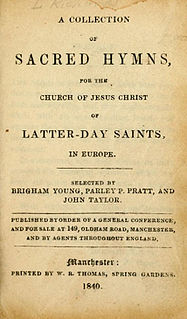
A Collection of Sacred Hymns for the Church of Jesus Christ of Latter-day Saints in Europe, informally known as the Manchester Hymnal, was first published in Manchester, England, in 1840. Like the first Latter Day Saint hymnal, this hymnal is text-only; it went through many editions, lasting until 1912 —future editions supposedly had extra hymns added, but the first few had 271.
The Begatting of the President is a satirical album narrated by Orson Welles, summarising the presidency of Lyndon B. Johnson and the election of 1968, leading up to the election of Richard Nixon, delivered in the style of Biblical verse.
John 1:21 is a verse in the first chapter of the Gospel of John in the New Testament.

John 1:48 is a verse in the first chapter of the Gospel of John in the New Testament.
Matthew 12:49-50 is a set of verses in the twelfth chapter of the Gospel of Matthew in the New Testament.
References
- ↑ John MacEvilly, An Exposition of the Gospel of St. John consisting of an analysis of each chapter and of a Commentary critical, exegetical, doctrinal and moral, Dublin Gill & Son 1879.
- ↑ Cornelius Cornelii a Lapide; Thomas Wimberly Mossman The great commentary of Cornelius à Lapide, London: J. Hodges, 1889-1896.
- 1 2 3 4 5 6 "Catena aurea: commentary on the four Gospels, collected out of the works of the Fathers: Volume 6, St. John. Oxford: Parker, 1874. Thomas Aquinas".
 This article incorporates text from this source, which is in the public domain .
This article incorporates text from this source, which is in the public domain .